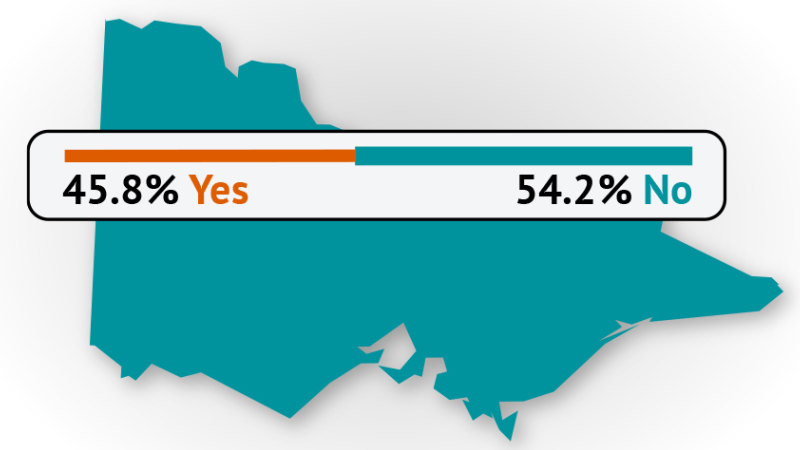Save articles for later
Add articles to your saved list and come back to them any time.
Key points
- 54 per cent of Victorian voters say they oppose the Voice, up from 51 per cent in August and September.
- Voters in Melbourne’s inner suburbs are some of the strongest supporters of the proposal, while those in rural parts of the state are 72 per cent against it.
- Support for the Voice has fallen in Victoria at the same time it has declined nationwide.
Victorians have cut their support for the Indigenous Voice in a move that weakens a small national swing towards the Yes campaign, with 54 per cent of state voters saying they oppose the change.
The statewide majority against the Voice has grown from 51 per cent in August and September and now holds a clear lead in the final week of the referendum, dashing early hopes in the Yes campaign about the scale of Victorian support.
Voters in Melbourne’s inner suburbs are some of the strongest supporters of the proposal, with 58 per cent in favour, but this has not been enough to prevent a steady rise in the No vote across the state over the past year.
Voters in outer suburbs are 53 per cent against the Voice while those in regional areas are 52 per cent against and those in rural parts of the state are 72 per cent against it on a “yes or no” question akin to the referendum.
The exclusive findings in the Resolve Political Monitor show the challenge for the Yes side in Victoria when many campaigners assumed the state would be a foundation block for success at the referendum, which requires a national majority as well as a Yes vote in at least four states.
“The vote in Victoria has No ahead by 54 to 46 per cent, which is just outside the margin of error of this survey,” Resolve Strategic director Jim Reed said.
“That means we are pretty sure of the No lead.
“It is closer than the national vote of 56 per cent No to 44 per cent Yes, but not by much.
“The Yes vote has dropped 18 points in Victoria over the last year and is now pretty stable.”
The Resolve Political Monitor surveyed 4728 eligible voters nationwide between September 22 and October 4 using the full wording of the proposed change to the Constitution in the referendum bill passed by parliament in June as well as the exact wording of the question being put to voters on official ballot papers. The Victorian results are based on responses from 1022 people across the state.
Support for the Voice has fallen in Victoria at the same time it has declined nationwide, with 64 per cent of the state’s voters backing the proposal in August and September last year, when the Resolve Political Monitor combined two monthly surveys to track state trends.
Backing for the proposal in Victoria increased slightly to 65 per cent in a survey conducted in December and January, but it fell to 56 per cent in May and June and tumbled to 49 per cent in the August and September results published last month – the first time the No side gained the majority in the state.
Coalition voters are among the greatest opponents of the change in Victoria, with 84 per cent against it in a finding that matches the national results.
Victorian Opposition Leader John Pesutto declared in early September he would oppose the Voice, while conservative MP Bev McArthur and colleagues such as Georgie Crozier, David Hodgett, Brad Battin, David Davis, Matthew Guy, Brad Rowswell, Renee Heath, Trung Luu and Nick McGowan also oppose the change.
The new survey shows 69 per cent of Labor voters in the state back the Voice, slightly more than the national figure of 67 per cent.
Premier Jacinta Allan joined other state leaders last Friday to reaffirm their support for the Voice at a public event in Adelaide attended by Labor counterparts including South Australian Premier Peter Malinauskas, West Australian Premier Roger Cook and NSW Premier Chris Minns.
While some Victorian Greens oppose the Voice and former Greens Victorian senator Lidia Thorpe is one of the most high-profile critics of the proposal, the latest results show that 82 per cent of the state’s Greens voters say they will vote Yes.
Cut through the noise of federal politics with news, views and expert analysis. Subscribers can sign up to our weekly Inside Politics newsletter.
Most Viewed in Politics
From our partners
Source: Read Full Article
